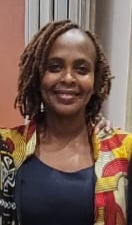MWIKYA, Dr Anne
Kenya - Family Doctor
My WONCA Experience

MBCHB - University of Nairobi, Kenya
MMED-FP University of Medical Sciences of Havana, Cuba
My Journey in Family Medicine
From the outset of my medical career, I have been deeply passionate about providing holistic patient care. This passion naturally drew me to family medicine, a specialty that offers the unique opportunity to treat patients in a person-centered way. Throughout my training, I realized the immense satisfaction that comes from building long-term relationships with patients and addressing a wide spectrum of health issues.
Working in diverse settings, from rural clinics to urban hospitals, has enriched my understanding and commitment to family medicine. I experienced firsthand the profound impact of preventive care, early diagnosis, and ongoing patient education. The versatility and breadth of family medicine allowed me to appreciate the importance of continuous and comprehensive care, a hallmark of this field.
My Current Work as Primary Health Care Network Coordinator in Nairobi County, Kenya
Currently, I serve as the Primary Health Care Network Coordinator in Nairobi County, Kenya. My role involves overseeing the integration and coordination of primary health care services through the establishment of primary health care networks across various sub-counties. This includes ensuring a multidisciplinary team approach in health programs as well as ensuring effective linkages between the community, primary care facilities, and tertiary facilities.
One of my key tasks is streamlining communication and collaboration among healthcare providers, be it private, faith-based organizations, or public sectors, ensuring timeliness and appropriate care provision. This position allows me to advocate for better health policies and resource allocation, aiming to make a tangible difference in the health outcomes of the population.
The Biggest Challenges and Opportunities for Primary Health Care in Kenya
Primary health care in Kenya faces significant challenges. One of them is the shortage of healthcare professionals, exacerbated by the uneven distribution of medical personnel across the country. Another challenge is the limited funding and resources available for primary health care. This often results in inadequate infrastructure, insufficient medical supplies, and outdated equipment. Additionally, there is a need for more robust integrated health information systems to improve data collection, analysis, and utilization in decision-making processes.
Despite these challenges, there are numerous opportunities to strengthen primary health care in Kenya. Leveraging technology to enhance health services presents a major opportunity. Telemedicine, mobile health applications, and electronic health records, as observed in the establishment of the electronic community health system (eCHIS), can greatly improve access to care. Furthermore, community health worker programs have shown great promise in extending the reach of primary health care services.
Key Lessons Learned During the WONCA Africa Region Conference
Attending the WONCA Conference in Kenya was a transformative experience. It provided a platform to learn from global experts in family medicine and primary health care. One of the key lessons I learned was the importance of community involvement in healthcare delivery. Engaging local communities in health initiatives fosters trust, encourages healthy behaviors, and ensures interventions are culturally appropriate and sustainable.
Another valuable takeaway was the significance of continuous professional development and education for healthcare providers. Keeping abreast of the latest medical advancements and best practices is crucial for delivering high-quality care.
Experience from the Cuban Health System
My training as a resident in family medicine allowed me to acquire a sea of knowledge and practical skills from one of the best-organized healthcare systems in the world. The Cuban health system, with its strong primary health care basis, applies principles of decentralization, multisectoral engagements, and active community participation in health decision-making. This approach has led to significant positive impacts on Cuban health indicators. Family physicians in community clinics serve as the entry point to their health system, allowing appropriate linkage to care at all tiers. Health prioritization of community needs, with a focus on prevention, early diagnosis, treatment, and continuous health promotion activities, has significant economic value for the country.
My Interests and Passion
My interests and passions are deeply rooted in improving health outcomes and ensuring equitable access to quality care for all. I am also keenly interested in health systems strengthening and policy advocacy. I believe that systemic changes and effective health policies are essential for creating sustainable improvements in health care delivery.
In my personal time, I enjoy participating in community health outreach programs and mentoring young healthcare professionals. These activities allow me to give back to the community.
Conclusion
My journey in family medicine has been shaped by a passion for holistic care and a commitment to improving health outcomes. As the Primary Health Care Network Coordinator in Nairobi County, I strive to enhance the quality and accessibility of primary health care services. Despite the challenges faced by the healthcare system in Kenya, there are significant opportunities for improvement through technology, community involvement, and robust health policies. The lessons learned from the WONCA Conference have further reinforced the importance of community engagement and continuous professional development. My dedication to preventive medicine, health education, and systemic change drives my work and fuels my passion for making a difference in the lives of individuals and communities.